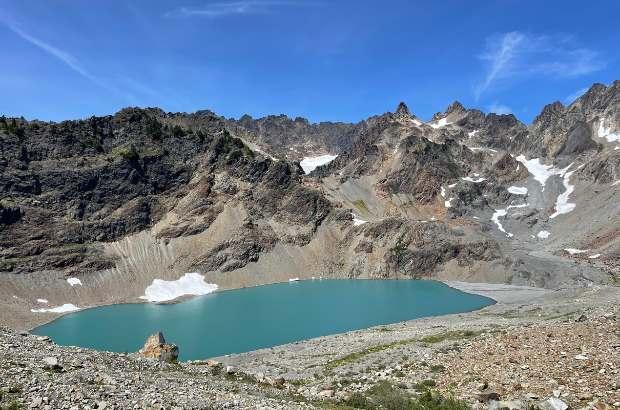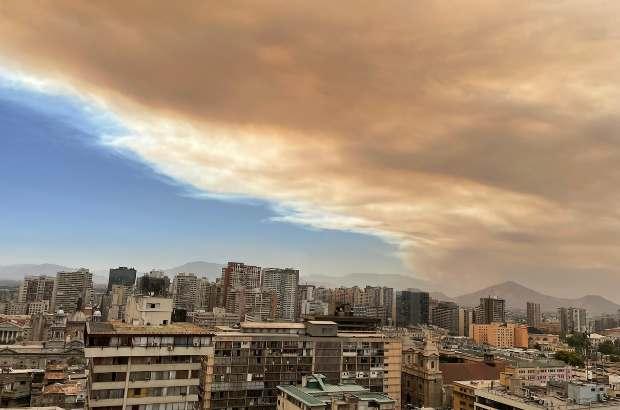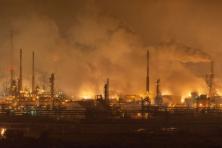While oil companies win, our communities and lands lose.
A couple of weekends ago, I went backpacking with my husband to Enchanted Valley in Olympic National Park. It was beautiful! We saw a bear! But our trip was also marked by the inescapable fact of the climate crisis hitting home. On our second day, I hiked up to Anderson Pass, then up switchbacks to Anderson Moraine. Moraine is a wall of rocks and sediment that forms at the edge of a glacier. Only there was no glacier to be found, not anymore. Anderson Glacier disappeared fully in 2015, leaving behind a small lake where a mighty wall of ice used to be. As we later descended out of the valley, we began to catch whiffs of smoke. “But there’s a burn ban…,” we said to each other, then realized it was not campfires, but smoke from distant wildfires that we were smelling. We began to see the particulate haze coating ridges across from us. And the temperature began to rise; by the time we finished our hike, it was in the mid-90s. The heat wave was beginning.
We suffer climate impacts. Oil companies collect profits while causing these impacts.
Over the next few days, Seattle saw record-breaking nighttime temperatures, a particular danger for vulnerable people who rely on cooling overnight to get a break from unrelenting heat stress. The streak of 90-degree days continued a pattern that has emerged in recent years. Historically, our region had an average of three 90-degree days a year. Since 2010, that has risen to five; and this month, Seattle saw four 90-degree days in a row—the second-warmest start to August on record. Portland suffered through its second-hottest day ever; that city’s hottest day occurred just a couple of years ago, during the infamous June 2021 heat dome.
Shell made $5 billion in profit in the second quarter of 2023 alone. In the first quarter, their profits were even double that.More smoke followed the heat wave. On August 20, Seattle had the worst air quality in the world, and Portland the third-worst, due to the smoke coming from fires burning in British Columbia, Eastern Washington, and the Cascade mountains. Eastern Washington experienced even worse air quality, becoming hazardous. Spokane’s Clean Air Agency had only measured hazardous air quality across an entire day four times before—all in 2020. The fire burning near Medicine Lake has killed at least one person and destroyed almost 200 buildings.
Chevron brought in $6 billion in profit in the second quarter of 2023. It also extracted a record amount of fossil fuels from the Permian basin during this period. In fact, U.S. crude oil production is expected to hit a record high this year, and be surpassed in 2024.Just before this latest Pacific Northwest heat wave and smoke episode, western Maui was ravaged by a fast-moving wildfire. At least 114 people died, around 850 remain unaccounted for, and 6,000 people have been displaced. Rising temperatures and drought created a tinderbox that, fanned by winds from a passing hurricane, produced a devastating blaze that overran the town of Lāhainā and surrounding areas.
Exxon made $7.8 billion in profit in the second quarter of 2023—nearly double that of the same period in 2018 when prices for the industry were similar. It also produced a record amount of oil from the Permian basin and in Guyana. Global investments in oil exploration, extraction, and production are on course to reach their highest levels since 2015–investment that “exceeds the amount that would be needed in a world that gets on track for net zero emissions.”Communities are experiencing the increased intensity and lethality of weather events all over the globe. In the past two months, Argentina and Chile have experienced record high temperatures. One Chilean town exceeded 101 degrees (note that it is winter in the Southern Hemisphere). Slovenia saw extreme floods, their “worst-ever natural disaster.” Deadly heavy rain, landslides, and monsoon conditions in India have killed over 100 individuals and forced over 30,000 people into camps. These are only a few examples among many.
Marathon made $2.2 billion in the second quarter of 2023. Phillips 66 brought in $1.8 billion. Valero raked in $1.9 billion.July was the hottest month ever recorded. August was filled with extreme weather-related events both in the Pacific Northwest and all around the world. According to climate scientist Daniel Swain, “In terms of [the] incredibly frenetic pace of global extremes we are seeing this summer, in terms of temperatures and precipitation, that’s only going to get worse as the climate continues to warm.” “Twenty years from now, a summer like this is going to feel like a mild summer.”
Oil companies use their profits to try to block climate action.
What do the oil companies whose recent profits are listed above have in common? They are members of the Western States Petroleum Association (WSPA). This year alone, one of WSPA’s lobbyists in Washington has transferred $1.125 million to Affordable Fuel Washington, a faux “grassroots” group that is running advertisements in which they blame high gas prices on Washington’s climate policies in an attempt to simultaneously deflect blame from themselves while trying to undermine critical climate and resiliency measures that would address the climate crisis—a crisis that is significantly of their own making.
The oil industry is responsible not only for the price at the gas pump, but also for the costs of the climate crisis we are all paying today: the box fans and filters we have to purchase to try to secure clean air in our homes, the extra inhaler refills, the air conditioning units and the energy needed to power them, the mental toll of being stuck indoors, not to mention the devastating impacts for those whose homes have burned or flooded.
These companies have long known about their key role in causing the climate crisis, but have lied and sown doubt while spending many millions of dollars trying to block and overturn climate policy, rather than change course and futureproof their businesses by shifting to sustainable endeavors. In Washington alone, WSPA has spent more than $3.2 million on lobbying since 2020. They fought the Climate Commitment Act, which put a cap on pollution, is holding polluters accountable, and is investing in solutions that cut climate and air pollution and protect people from climate impacts. They fought the Clean Fuel Standard, which cuts pollution from transportation fuel. During public testimony against this policy, one of WSPA’s lobbyists, when questioned by a Washington State legislator, wouldn’t even answer whether combusting petroleum causes greenhouse gases.
Fossil fuel companies and their spokespeople are simply not trustworthy, nor do they have our best interests at heart. Their goal is, and has been, to maximize their profits while knowingly condemning us to ever-more harsh climate impacts and air pollution. WSPA’s dogged attempts to undermine climate policy in Washington are so extreme that BP left the association.
The oil industry won’t do the right thing on their own: we need to take climate action AND hold them accountable.
The oil industry has had decades to clean up their act—both by shifting their business to clean energy and by coming clean with the public about the impacts of their product on the environment and our health. But, time and time again, they have proven unwilling to do either.
Because of the oil industry’s continued refusal to do the right thing, and because they have, in fact, doubled down on doing the wrong thing by fighting climate policies, it is time for the Washington State Legislature to hold them accountable. Climate Solutions strongly supports proposals requiring the oil industry to be more transparent about their costs and profits, and protecting people against price gouging. Washington has policies in place so that, finally, polluters must pay for their pollution–it is time to ensure that they are held accountable for their manipulation, too.
Making polluters pay and cut their pollution is just one element of critical climate policies such as the Climate Commitment Act and the Clean Fuel Standard. Stay tuned for future blog posts on investments that will benefit Washingtonians across the state, funded by the Climate Commitment Act auctions.







